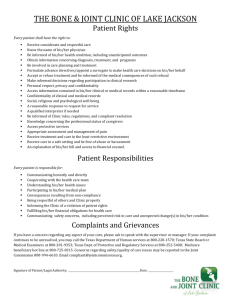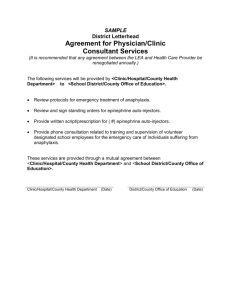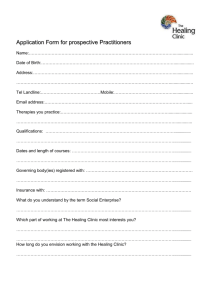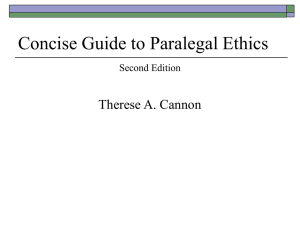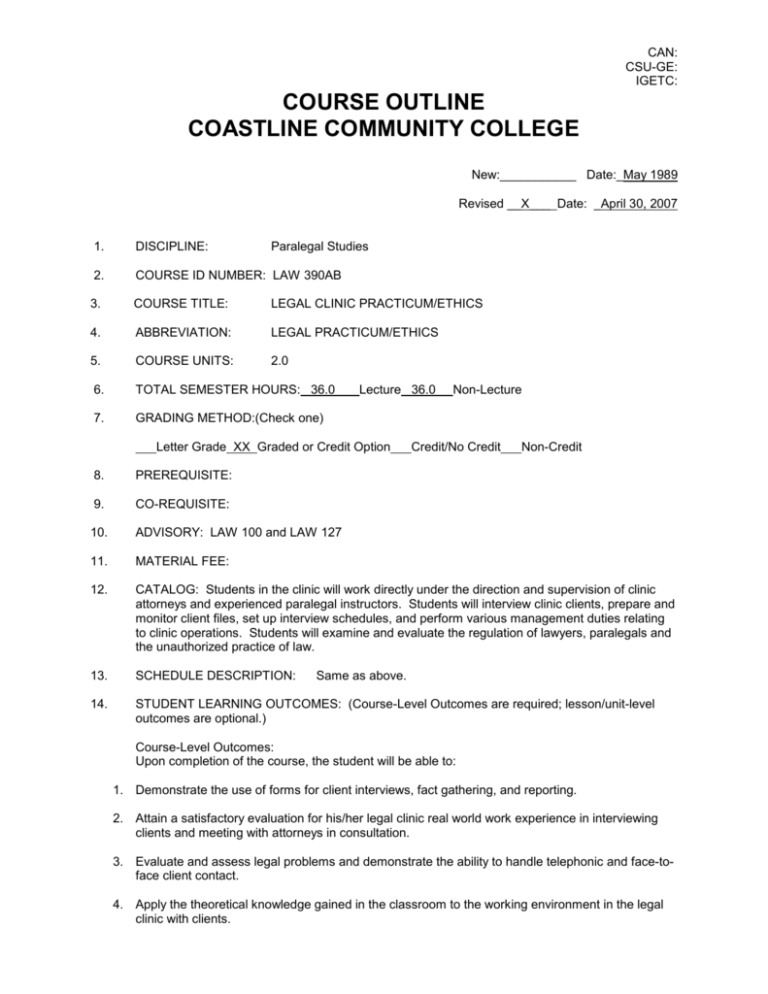
CAN:
CSU-GE:
IGETC:
COURSE OUTLINE
COASTLINE COMMUNITY COLLEGE
New:___________ Date:_May 1989
Revised __X___ Date: _April 30, 2007
1.
DISCIPLINE:
Paralegal Studies
2.
COURSE ID NUMBER: LAW 390AB
3.
COURSE TITLE:
LEGAL CLINIC PRACTICUM/ETHICS
4.
ABBREVIATION:
LEGAL PRACTICUM/ETHICS
5.
COURSE UNITS:
2.0
6.
TOTAL SEMESTER HOURS: 36.0
7.
GRADING METHOD:(Check one)
Lecture 36.0
Letter Grade XX Graded or Credit Option
Non-Lecture
Credit/No Credit
Non-Credit
8.
PREREQUISITE:
9.
CO-REQUISITE:
10.
ADVISORY: LAW 100 and LAW 127
11.
MATERIAL FEE:
12.
CATALOG: Students in the clinic will work directly under the direction and supervision of clinic
attorneys and experienced paralegal instructors. Students will interview clinic clients, prepare and
monitor client files, set up interview schedules, and perform various management duties relating
to clinic operations. Students will examine and evaluate the regulation of lawyers, paralegals and
the unauthorized practice of law.
13.
SCHEDULE DESCRIPTION:
14.
STUDENT LEARNING OUTCOMES: (Course-Level Outcomes are required; lesson/unit-level
outcomes are optional.)
Same as above.
Course-Level Outcomes:
Upon completion of the course, the student will be able to:
1. Demonstrate the use of forms for client interviews, fact gathering, and reporting.
2. Attain a satisfactory evaluation for his/her legal clinic real world work experience in interviewing
clients and meeting with attorneys in consultation.
3. Evaluate and assess legal problems and demonstrate the ability to handle telephonic and face-toface client contact.
4. Apply the theoretical knowledge gained in the classroom to the working environment in the legal
clinic with clients.
5. Assess communication processes and evaluate ethical issues and client confidentiality.
6. Compare and distinguish between conflicts of interest, legal advice, and the unauthorized practice
of law as applied to given fact patterns and client in-person interviews.
7. Score a passing grade on the required ethics examination.
This course is a legal specialty course developed in accordance with the standards and
guidelines required by the American Bar Association, Standing Committee on Paralegals
which body has approved the Paralegal Studies Program at Coastline Community
College. Section G-302 I. Of said Guidelines, as approved September 1, 2003, states as
follows:
“The following requirements apply to legal specialty courses: 1. A legal specialty course is
a course that (1) covers substantive law or legal procedures or process, (2) has been
developed for paralegals, and (3) emphasizes practical paralegal skills.”
15.
COURSE CONTENT: (Instructional topics or units. Use outline format.)
I.
16.
CLIENT CONTACT AND CLINIC PROCEDURES
A.
Interviewing objectives
1. Telephonic
2. Face-to-face
3. Note taking
(3 hours)
B.
Ongoing Student Evaluations
1. Student documentation review
2. Student communication skills review
3. Conflict resolution
4. Human relations skill development
(3 hours)
C.
Class Procedures
1. Clinic communications
a. Types
b. Purposes
c. Qualifying for services
2. Forms
a. Information and signature form
b. Interview sheet
c. Record keeping/procedures
(3 hours)
3. Clinic security
4. Clinic confidentiality of records and information
5. Equipment, supplies and college services
(3 hours)
II
ETHICAL ISSUES FOR PARALEGALS AND LAWYERS
(16 to 18 hours spread throughout the semester)
A.
Regulation of lawyers and paralegals
B.
Unauthorized practice of law
C.
Confidentiality
D.
Conflicts of interest
E.
Advertising and solicitation
F.
Fees and client funds
G.
Competence, negligence and professionalism
H.
Personal motivation and career advancement
III
IV
In-service time with clients and attorney consultations
Examinations
(28 to 36 hours)
(4 hours)
MULTIPLE METHODS AND DELIVERY OF INSTRUCTION: (Instructor-initiated learning strategies.
A paragraph must be written by the instructor for classroom instruction for all courses.)
In the classroom portion of this course the instructor may use traditional methods of lecture/discussion,
student presentations, guest lecturers, and cooperative learning group activities. The instructor will also regularly
assign ethical and practical issues to the discussed in class as oral reports. In addition to reading and oral
assignments the visiting attorney may assign legal research or an information search to be done for a client seeking
consultation at the clinic. Oral communication is used extensively in this course.
17.
ASSESSMENT METHODS: (Measurements of learning outcomes. If rubrics have been
developed for scoring course-level SLOs, please attach.)
Assessment Method
Quizzes
Written
Assignments
Midterm
Examination
Essay Examination
Objective
Examination
Reports
Projects
Non-Mathematical
and ProblemSolving Exercises
Skills
Demonstration
Final Examination
Describe the style and content of each assessment
method to be used in measuring SLOs
Individual weekly assignments applying ethical and
practical applications with case briefs and oral
reports in class for review and discussion.
Objective and short answer questions testing the
rules and processes required for the safe and ethical
operation of the legal clinics.
Weekly clinic analysis and practical applications to
paralegal ethical standards and skills development
from face-to-face contact with clients and interview
analysis.
Objective and essay questions testing the application
of ethical issues for the regulation of paralegals
and lawyers, confidentiality and professionalism and
the skills of interviewing and investigation.
Other
18.
RECOMMENDED TEXTBOOK(S):
Ethics and Professional Responsibility for Paralegals, 4th Edition (2004) by Cannon, Aspen Pub.,
ISBN 0-7355-2904-3
- OR Concise Guide to Paralegal Ethics, 2d Ed., by Cannon (2006), Aspen Pub. ISBN 0-7355-5108-1
- OR –
Ethics for the Legal Professional, 6th Ed., by Orlik, Pearson/Prentice Hall Publisher, (2008), ISBN
0-13-243647-7
19.
SUPPLEMENTAL READING:
Coastline College’s Virtual Library: http://library.coastline.edu
20.
OTHER REQUIRED SUPPLIES AND MATERIALS:
None.
Type the following appropriate names:
Prepared by Faculty: Margaret Lovig and David Fuller
Department Chair: Margaret Lovig
Interim Discipline Dean: Vince Rodriguez
Distance Learning Dean: n/a
Date of Curriculum Committee Meeting: May 18, 2007 - Revision
X_
Approved _____ Disapproved _____ Tabled



